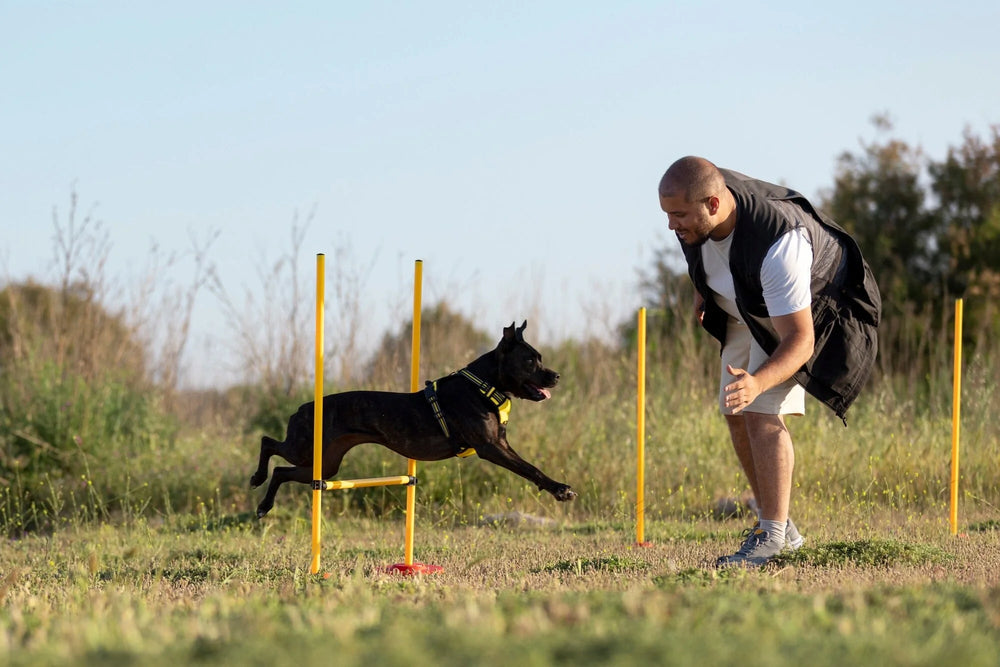When we think about food sensitivities in dogs, skin irritation and digestive upset typically come to mind first. However, emerging research reveals a profound connection between food reactions and behavioral changes that many pet parents overlook.

Beyond Digestion: How Food Sensitivities Affect Your Dog's Behavior and Mood
When we think about food sensitivities in dogs, skin irritation and digestive upset typically come to mind first. However, emerging research reveals a profound connection between food reactions and behavioral changes that many pet parents overlook. Understanding this "gut-brain axis" helps explain why addressing food sensitivities with appropriate alternatives like TailBlaze Back to C Sensitive Treats can transform not just your dog's physical comfort, but their behavior and mood as well.
The Gut-Brain Connection in Dogs
Your dog's digestive system and brain communicate continuously through multiple pathways, including:
-
The Vagus Nerve: This direct communication highway carries signals between the gut and brain, with approximately 80% of the traffic flowing from gut to brain rather than vice versa.
-
Gut Microbiome Influence: The billions of bacteria in your dog's digestive tract produce neurotransmitters and metabolites that directly affect brain function and behavior.
-
Inflammatory Signaling: Inflammation in the gut triggers systemic inflammatory responses that can affect brain tissue and function.
-
Nutrient Absorption: Gut inflammation impairs absorption of nutrients essential for optimal brain function and mood regulation.
When food sensitivities trigger inflammatory responses in the digestive tract, these communication pathways become disrupted, potentially causing significant behavioral changes.
Behavioral Signs of Food Sensitivities
Pet parents and veterinarians report numerous behavioral changes associated with food sensitivities, including:
1. Irritability and Reactivity Dogs with food sensitivities often display:
- Increased reactivity to normal stimuli
- Lower threshold for frustration
- Seemingly unprovoked aggression
- Intolerance of handling or grooming
2. Anxiety and Restlessness Inflammatory responses can alter neurochemistry, leading to:
- Pacing or inability to settle
- Heightened startle response
- Compulsive behaviors like excessive licking
- Sleep disturbances
3. Focus and Trainability Issues Cognitive impacts include:
- Difficulty concentrating during training
- Inconsistent command response
- Apparent "stubbornness" or "selective hearing"
- Reduced problem-solving ability
4. Energy Level Abnormalities Dogs may display either:
- Lethargy and depression despite adequate rest
- Hyperactivity and inability to calm down
- Dramatic fluctuations between energy extremes
5. Social Behavior Changes Many sensitive dogs show:
- Withdrawal from social interactions
- Reduced play behavior
- Irritability with other pets
- Changes in bonding behaviors with family members
The Science Behind the Symptoms
Recent studies have identified several mechanisms connecting food sensitivities to behavioral changes:
Inflammatory Cytokines: These immune signaling molecules released during food reactions can cross the blood-brain barrier, affecting mood regulation and cognitive function.
Neurotransmitter Production: Up to 90% of serotonin (the "happiness neurotransmitter") is produced in the gut. Inflammation disrupts this production, potentially leading to anxiety and mood disorders.
Nutrient Malabsorption: Chronic gut inflammation reduces absorption of brain-essential nutrients like omega-3 fatty acids, B vitamins, and amino acids needed for neurotransmitter synthesis.
Microbiome Disruption: Food sensitivities alter gut bacterial populations, changing the profile of metabolites that influence brain function and behavior.
Pain-Induced Behavior: Sometimes the simplest explanation is correct—dogs experiencing the discomfort of food reactions may become irritable just as humans do when in pain.
The Back to C Solution for Behavior and Digestion
TailBlaze Back to C Sensitive Treats are formulated specifically to address this gut-brain connection through:
-
Novel Protein Source: The fish-based formula provides a protein alternative for dogs sensitive to common proteins like chicken or beef.
-
Anti-inflammatory Ingredients: Natural anti-inflammatory components help calm existing gut inflammation that may be affecting behavior.
-
Brain-Supporting Nutrients: Essential fatty acids from fish support neural function and mood regulation.
-
Limited Ingredient Approach: Minimizes the potential for reactions to multiple components.
-
Highly Digestible Formula: Reduces the digestive workload, allowing healing of irritated gut tissues.
Many pet parents report significant behavioral improvements within weeks of addressing food sensitivities, including:
- Calmer, more consistent demeanor
- Improved focus during training
- Better sleep patterns
- Reduced anxiety behaviors
- More appropriate social interactions
The transformation can be particularly dramatic in dogs whose sensitivities have gone unrecognized for extended periods, as they experience relief from chronic discomfort they couldn't communicate.
By understanding the powerful gut-brain connection, pet parents can recognize behavioral signs that might indicate food sensitivity and take appropriate action. TailBlaze Back to C Sensitive Treats provide a safe, enjoyable option for dogs with sensitivities, supporting both physical comfort and behavioral balance.
Support your sensitive dog's digestive and behavioral health with TailBlaze Back to C Sensitive Treats—because comfort begins in the gut and radiates throughout body and mind.






